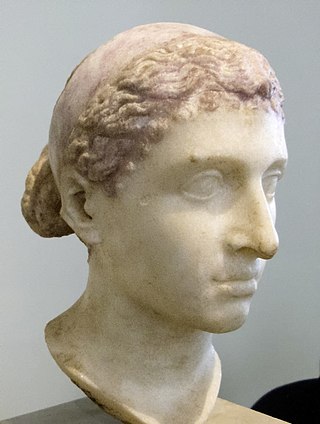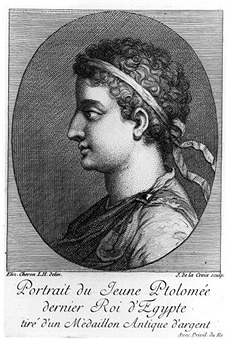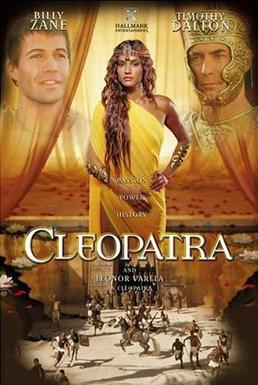
Marcus Antonius, commonly known in English as Mark Antony, was a Roman politician and general who played a critical role in the transformation of the Roman Republic from a constitutional republic into the autocratic Roman Empire.
This article concerns the period 39 BC – 30 BC.

This article concerns the period 49 BC – 40 BC.

Cleopatra VII Thea Philopator was Queen of the Ptolemaic Kingdom of Egypt from 51 to 30 BC, and its last active ruler. A member of the Ptolemaic dynasty, she was a descendant of its founder Ptolemy I Soter, a Macedonian Greek general and companion of Alexander the Great. Her first language was Koine Greek, and she is the only Ptolemaic ruler known to have learned the Egyptian language. After her death, Egypt became a province of the Roman Empire, marking the end of the last Hellenistic-period state in the Mediterranean, a period which had lasted since the reign of Alexander.

Ptolemy XIII Theos Philopator was Pharaoh of Egypt from 51 to 47 BC, and one of the last members of the Ptolemaic dynasty. He was the son of Ptolemy XII and the brother of and co-ruler with Cleopatra VII. Cleopatra's exit from Egypt caused a civil war to break out between the pharaohs. Ptolemy later ruled jointly with his other sister, Arsinoe IV.

Ptolemy XII Neos Dionysus was a king of the Ptolemaic Kingdom of Egypt who ruled from 80 to 58 BC and then again from 55 BC until his death in 51 BC. He was commonly known as Auletes, referring to his love of playing the flute in Dionysian festivals. A member of the Ptolemaic dynasty, he was a descendant of its founder Ptolemy I, a Macedonian Greek general and companion of Alexander the Great.

Ptolemy XIV Philopator was a Pharaoh of the Ptolemaic Kingdom of Egypt, who reigned from 47 until his death in 44 BC.

Arsinoë IV was the fourth of six children and the youngest daughter of Ptolemy XII Auletes. Queen and co-ruler of Ptolemaic Egypt with her brother Ptolemy XIII from 48 BC – 47 BC, she was one of the last members of the Ptolemaic dynasty of ancient Egypt. Arsinoë IV was also the half sister of Cleopatra VII. For her role in conducting the siege of Alexandria against her sister Cleopatra, Arsinoë was taken as a prisoner of war to Rome by the Roman triumvir Julius Caesar following the defeat of Ptolemy XIII in the Battle of the Nile. Arsinoë was then exiled to the Temple of Artemis at Ephesus in Roman Anatolia, but she was executed there by orders of triumvir Mark Antony in 41 BC at the behest of his lover Cleopatra VII.
Pothinus or Potheinos, a eunuch, was regent for Pharaoh Ptolemy XIII Theos Philopator of the Ptolemaic Kingdom. He is most remembered for turning Ptolemy against his sister and co-ruler Cleopatra, thus starting a civil war, and for having Pompey decapitated and presenting the severed head to Julius Caesar according to some sources.

The Battle of the Nile in early 47 BC saw the combined Roman–Egyptian armies of Julius Caesar and Cleopatra VII defeat those of the rival Queen Arsinoe IV and King Ptolemy XIII and secure the throne of Egypt.

Cleopatra is a 1999 miniseries adaptation of Margaret George's 1997 historical fiction novel The Memoirs of Cleopatra. Produced by Hallmark Entertainment, it stars Leonor Varela as the Egyptian queen Cleopatra, Timothy Dalton as Julius Caesar, Billy Zane as Mark Antony, Rupert Graves as Octavius, Sean Pertwee as Brutus and Bruce Payne as Cassius. Cleopatra was shown first on the ABC television network in two parts on two consecutive evenings in May 1999 and then released on videotape and DVD. Judy Farr, Martin Hitchcock and Frank Walsh were nominated for an Emmy in 1999 for outstanding art direction for a miniseries or a movie for their work on Cleopatra.

Caesar and Cleopatra is a play written in 1898 by George Bernard Shaw that depicts a fictionalized account of the relationship between Julius Caesar and Cleopatra. It was first published with Captain Brassbound's Conversion and The Devil's Disciple in Shaw's 1901 collection Three Plays for Puritans. It was first performed in a single staged reading at Newcastle upon Tyne on 15 March 1899, to secure the copyright. The play was produced in New York in 1906 and in London at the Savoy Theatre in 1907.
The Alexandrian war, also called the Alexandrine war, was a phase of Caesar's civil war in which Julius Caesar involved himself in an Egyptian dynastic struggle. Caesar attempted to mediate a succession dispute between Cleopatra and Ptolemy XIII and exact repayment of certain Egyptian debts.

Achillas was one of the guardians of the Egyptian king Ptolemy XIII Theos Philopator, and commander of the king's troops, when Pompey fled to Egypt in September 48 BC. He was called by Julius Caesar a man of extraordinary daring, and it was he and Lucius Septimius who killed Pompey at the suggestion of the eunuch Pothinus and Theodotus of Chios.

Lucius Septimius was a Roman soldier and mercenary who is principally remembered as one of the assassins of the triumvir Pompey the Great. At the time of the assassination in 48 BC, Septimius was serving the Ptolemies of Egypt as a mercenary. He was dispatched with orders to murder Pompey by Ptolemy XIII's advisors who wanted to win the favour of Julius Caesar for their king.
Theodotus of Chios was the rhetoric tutor of the young Egyptian king Ptolemy XIII.
The Gabiniani were 2000 Roman legionaries and 500 cavalrymen stationed in Egypt by the Roman general Aulus Gabinius after he had reinstated the Pharaoh Ptolemy XII Auletes on the Egyptian throne in 55 BC. The soldiers were left to protect the King, but they soon adopted the manners of their new country and became completely alienated from the Roman Republic. After the death of Auletes in 51 BC, they helped his son Ptolemy XIII in his power struggle against his sister Cleopatra and even involved Julius Caesar, the supporter of Cleopatra, during Caesar's Civil War up to the siege of Alexandria in violent battles.

The military campaigns of Julius Caesar were a series of wars that reshaped the political landscape of the Roman Republic, expanded its territories, and ultimately paved the way for the transition from republic to empire. The wars constituted both the Gallic Wars and Caesar's civil war.
Her First Roman is a musical with music, lyrics, and book by Ervin Drake, based on the 1898 George Bernard Shaw play Caesar and Cleopatra.

The reign of Cleopatra VII of the Ptolemaic Kingdom of Egypt began with the death of her father, Ptolemy XII Auletes, by March 51 BC. It ended with her suicide in August 30 BC, which also marked the conclusion of the Hellenistic period and the annexation of Egypt into a Roman province. In the style of her Greek predecessors, Cleopatra reigned over Egypt and other territories as an absolute monarch, although the Roman Republic frequently interfered in its internal affairs. Her personal rule of Egypt was characterized by a continued reliance on agriculture, extensive trade and conflict with other states, the tackling of corruption, strategic management of the bureaucracy, and ambitious building projects.














